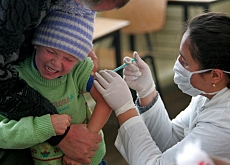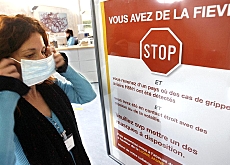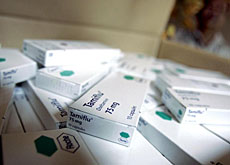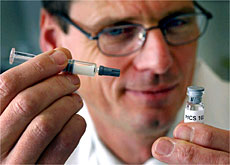Pandemic vaccine remains a long way off

Efforts to develop bird flu vaccines are being stepped up in western countries, but health experts say these are unlikely to be effective against a human pandemic.
If the virus were to spread to humans, a new vaccine would need to be developed – a process that could take six to nine months, according to the World Health Organization.
The Swiss interior minister, Pascal Couchepin, expressed concerns last weekend that Switzerland could not produce sufficient quantities of a human pandemic vaccine.
To date, the government has been stockpiling anti-viral drug Tamiflu for a quarter of the Swiss population.
It has also ordered 100,000 doses of a pre-pandemic vaccine against the highly pathogenic H5N1 strain of bird flu. But these would only be distributed to frontline workers dealing directly with infected birds.
Health office spokesman Jean-Louis Zurcher admitted that “if [H5N1] mutates and becomes a human virus, we’ll have to find another vaccine”.
And this would not happen overnight.
“According to the World Health Organization it would take six to nine months to really develop and produce a vaccine,” Sara Käch, head of communications at the pharmaceutical industry association Interpharma, told swissinfo.
Tamiflu
Käch said the only option in the meantime would be the anti-viral drugs – Roche’s Tamiflu and GlaxoSmithKline’s Relenza.
“We really do not know how the virus will mutate, but in Asia there have been cases where Tamiflu has been effective and we hope this will be this case – but no one can give a 100 per cent guarantee,” she said.
In the meantime, Zurcher confirmed to swissinfo that the 100,000 doses of the pre-pandemic H5N1 vaccine – ordered from France’s Sanofi Pasteur – would be delivered “by the end of the year”.
He denied that Switzerland had been slow to react, given that the Italian government received some 185,000 doses of the H5N1 vaccine from Sanofi Pasteur last week.
“It has nothing to do with that,” he said. “We don’t need [the H5N1 vaccine] now, but if there is an urgent need for it we could have it straightaway.”
Immune response
Countering doubts about the H5N1 vaccine’s efficiency, Sanofi Pasteur announced in December 2005 that preliminary results of the first clinical trials had shown a good immune response in a significant number of volunteers.
But the consensus among experts is that if the virus were to mutate so it could jump from human to human, the only vaccine that would help against a pandemic is a pandemic vaccine.
Zurcher would not give details on the health office’s discussions concerning such a vaccine, except to say that the health office was in talks with the pharmaceutical industry about a vaccine in the event of a pandemic.
“We’d like a pandemic vaccine for everyone and the talks with industry are in order to get the vaccine for everyone,” he said.
Outsourced
Couchepin said at the weekend that Switzerland’s sole vaccine producer, Berna Biotech, probably did not have the necessary capacity since much of its manufacturing had been outsourced abroad.
“I think we would have to import it,” said Käch at Interpharma. “But there are several politicians in several parties who do not think that this is the way Switzerland should go and that we should try to find a solution with Berna Biotech to produce our own vaccine.”
Zurcher added: “There is no production of flu vaccine in Switzerland so it will have to come from abroad anyway.
“The talks we are having [with industry] now are to know when the vaccine can be produced and when we can get some.”
swissinfo, Thomas Stephens
The tally of wild birds found dead with the H5N1 virus is now confirmed at nine: one from Geneva and eight from northern Switzerland in the area around Lake Constance.
So far no domestic fowl in Switzerland have tested positive for the disease. Last month the government re-introduced an outdoor ban on poultry in an effort to prevent the disease from spreading.
Protection and observation zones have been set up around areas affected by bird flu.
The World Health Organization says 174 people globally are confirmed to have caught bird flu and 94 of them have died.
It describes bird flu as unprecedented in its scope as an animal disease, saying it is costing the world’s agriculture industry more than $10 billion (SFr13.1 billion) and affecting the livelihoods of 300 million farmers.
The Swiss government has ordered 100,000 doses of an H5N1 “pre-pandemic” vaccine for frontline workers. This should be delivered by the end of 2006.
It has also ordered enough of the anti-viral drug Tamiflu for a quarter of the Swiss population.
Work cannot begin on a vaccine until a pandemic starts and scientists know the strain of virus they are up against.

In compliance with the JTI standards
More: SWI swissinfo.ch certified by the Journalism Trust Initiative




You can find an overview of ongoing debates with our journalists here. Please join us!
If you want to start a conversation about a topic raised in this article or want to report factual errors, email us at english@swissinfo.ch.